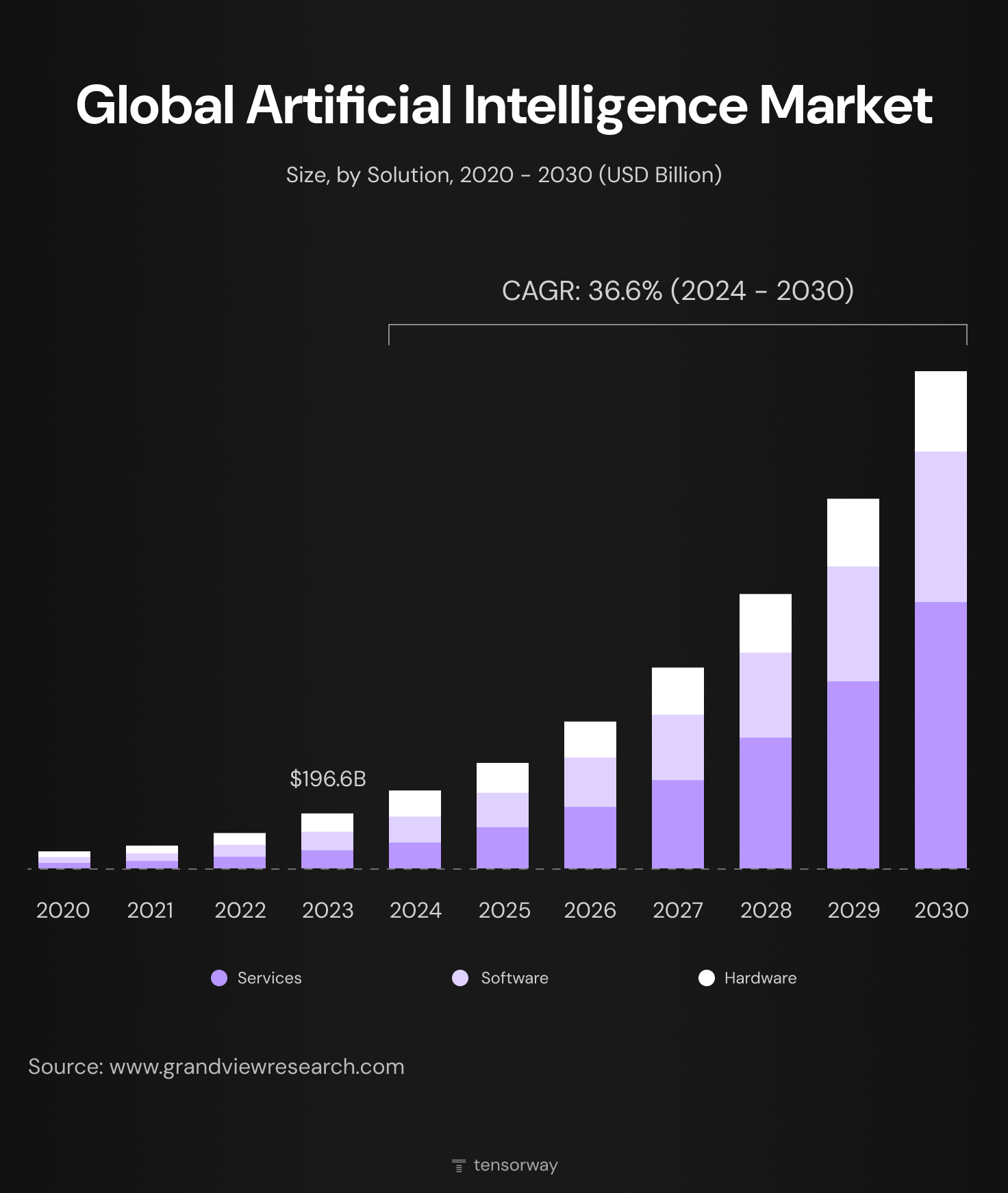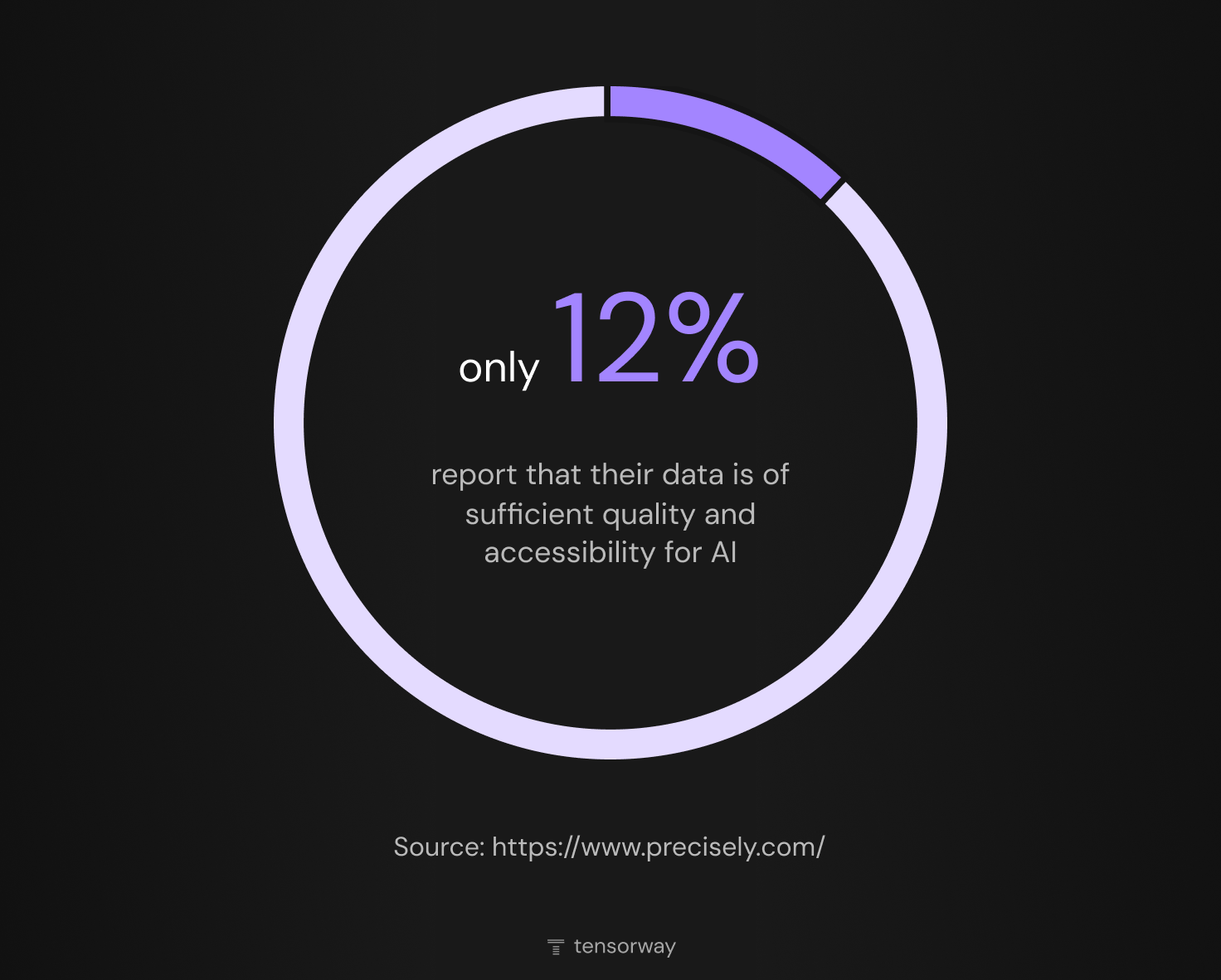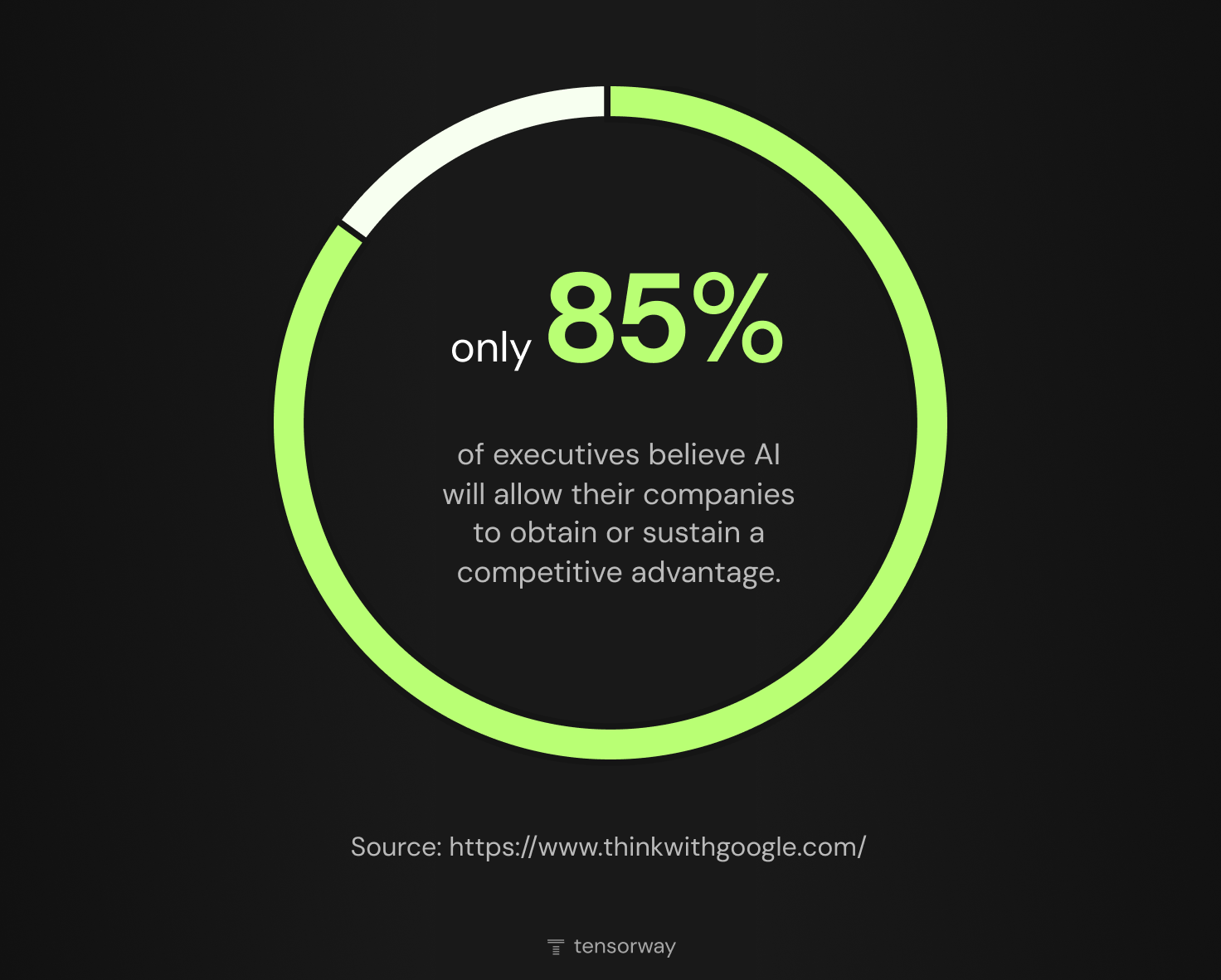Artificial intelligence is leading the transformation of various businesses since it redefines how companies carry out operations. Many would have considered implementing this technology a luxury just a few years ago. Now, failing to integrate AI into workflows can cost corporations valuable competitive advantage.
This advancement popularized off-the-shelf tools that business owners can deploy almost immediately. The question now becomes: should you invest in developing a custom system that is fully tailored to your needs or opt for turnkey AI solutions? The answer is more nuanced than it seems at first glance.
In our article, we will explore what each solution entails, the pros and cons of both options, the main factors that will affect your decision, and ultimately help you settle on the right approach for your objectives. Carefully weighing your choices is crucial for success, so let’s start with the basics.
What Are Off-the-Shelf AI Solutions?
The global market for artificial intelligence was valued at $196.63 billion in 2023 and is projected to grow at a rate of 36.6% from 2024 to 2030. This indicates an increasing interest in adopting this technology into business workflows across various industries. However, not every corporation is ready to invest time and resources into developing a custom AI model, so they have off-the-shelf options.

So, what are out-of-the-box AI systems?
Think of them as acquiring a toolkit that is designed to execute certain operational tasks, but is not tailored to your unique business objectives. Unlike AI development where you can customize every aspect of the model to address your individual needs, off-the-shelf solutions come with a predefined set of features and capabilities aimed at automating processes or providing data-driven insights.
Such AI business solutions are trained on large amounts of data with the intent to solve general-purpose problems. Naturally, this leaves very little room for adjusting the system to your liking but can offer a certain extent of configurations.
Most turnkey solutions work on a Software-as-a-Service (SaaS) basis. This typically involves purchasing a subscription plan for a monthly fee to use the program. The client can then access the program through plug-ins or application programming interface (API) integrations.
Since these programs are normally cloud-based, the client is not responsible for handling the underlying infrastructure. This is a great opportunity for startups and smaller businesses that may lack technical knowledge or budget for professional teams but still want to leverage artificial intelligence in their procedures.
Luckily, today the market continues to expand with lots of valuable offers, ranging anywhere from e-commerce AI solutions for marketing and supply chain management to financial services with personalized advice and predictive forecasting. The only obstacle in the way is finding the right out-of-the-box solution for your organization.
Common Types of Off-the-Shelf Solutions
Currently, the availability of turnkey AI software is still limited to certain operations, which is why many companies go the custom route to cover all of their operational needs. Still, as technology advances, we are likely to see more expanded functionality in these solutions. Let’s take a quick glance at the most common types of off-the-shelf artificial intelligence programs that are popular now.
AI assistants in customer support.
The customer support sector notoriously struggles with meeting the operational demands of consumers and processing vast loads of inquiries. Hence why AI solutions for business in this field have become so widespread. Commonly, organizations deploy chatbots and virtual assistants powered by Large Language Models (LLMs) and Natural Language Processing (NLP) to address this issue.
A prime example of a pre-made program is IBM watsonx Assistant. This AI tool can accurately process customers’ questions and provide resolutions around the clock. Its popularity is also attributed to the ease of implementation and a variety of support features.
Predictive analytics and demand forecasting.
In the financial sector, being able to predict market changes and economic conditions is a capability that most institutions strive to perfect. With out-of-the-box machine learning solutions, this process becomes more accurate and efficient, as algorithms can analyze historical data and forecast future fluctuations based on past trends.
On the other hand, retail corporations can also use this technology to evaluate sales history and identify market patterns to anticipate demand. This can include seasonal sales, the popularity of certain items at specific times, and more. Of course, such tools provide more generalized insights and are not necessarily tailored to an individual business.
Marketing and personalization.
Other types of ready-to-use AI business solutions that have gained traction in recent years are related to optimizing marketing and personalization efforts. Generative tools like Adobe Sensei aid companies in customizing customer journeys, iterating dynamic content, improving segmentation, driving recommendations based on the user’s behavior, and so on.
In addition, these models can extract more nuanced insights into the effectiveness of marketing campaigns and suggest areas of improvement based on actionable data. The tools provide a comprehensive look at KPIs across all marketing channels and pave the way for a better return on investments.
Key Factors to Consider When Choosing AI Solutions
To make an informed decision about which type of solution would be the most appropriate for your business, you need to have a comprehensive understanding of the key factors that differentiate each option. After all, both have their pros and cons in certain aspects, which makes weighing the ups and downs crucial.
Below, we will overview seven main points that may ultimately guide your choice.
Business Needs and Goals
The objectives and requirements you establish for the solution can be a primary factor in deciding which type best suits you.
Off-the-Shelf: If you are looking for a program to solve straightforward problems, then ready-to-use software can be sufficient. For example, if your goal is to automate customer support using chatbots, the functionality provided within generalized AI models is likely to be enough.
Custom: Choosing bespoke AI solutions for business will be a more effective option for addressing complex, enterprise-grade operations. If you want a model that can carry out industry-specific tasks, like financial predictive modeling, or deals with sensitive user data, then going the custom route is preferable.
Level of Customization
The amount of control you will have over the functionality of the solution can play a big role in making the right decision.
Off-the-Shelf: Pre-made artificial intelligence systems often have a predefined set of features aimed at resolving specific challenges. While some AI software enables you to conduct minor fine-tuning to adjust the program to your needs, the core functionality cannot be altered.
Custom: With custom AI solutions, you are gifted a large room for flexibility. By partnering with a development provider, you are free to establish your own scope of features, eliminating unnecessary functionality, which can be present in the off-the-shelf options.
Implementation and Deployment Time
The time it takes to start using the AI software, from contacting a provider to implementing it into your workflow, can be drastically different and ultimately affect your choice.
Off-the-Shelf: Such programs can be ready to use in a short time span. Although you won’t spend time on development, you will still be required to conduct research and find a turnkey solution that properly addresses your needs. After that, implementation can be done within days.
Custom: Training and deploying your own custom AI model is notoriously time-consuming, requiring months for the full-cycle process to be completed. If time is of the essence for your business, then building a solution from scratch might not be a good idea.
.png)
Integration with Existing Systems
The process of integrating an AI program into an existing system looks different for each type of solution, necessitating careful consideration.
Off-the-Shelf: Since these models are pre-built, there is a chance that integrating them into your specific system may pose a challenge. For example, AI solutions for e-commerce like autonomous restocking and order processing may require APIs or middleware to merge with your inventory management system.
Custom: Tailor-made artificial intelligence can be developed specifically to work smoothly with existing workflows. For instance, AI for invoice processing can be directly trained using the company’s historical data, allowing for seamless interaction with the underlying system.
Budget Limitations
There are short-term and long-term costs associated with choosing an artificial intelligence solution, which may not be obvious at first glance.
Off-the-Shelf: Most ready-to-use AI programs operate on a SaaS model, which involves paying a monthly fee for a subscription. While this is definitely a lower initial investment, it’s worth remembering that costs add up over time, especially if the subscription plan has any additional usage fees.
Custom: Assembling a development team and building your solution from the ground up is a hefty initial investment. The range of costs can vary drastically depending on the scope of work and the extent of functionality. However, the price can be lower in the long term since you own the software.
Potential for Scalability
One of the main differences between pre-made and bespoke systems lies in the opportunity to scale in the future.
Off-the-Shelf: Although some turnkey AI solutions allow for a certain level of increased workloads, most are unlikely to adapt to growing operational demands. If you don’t plan to raise data loads within your business, then scalability may not be an issue for you.
Custom: For corporations that expect to grow and expand their operational capacities, having an AI system that can adjust to higher-intensity processes becomes crucial. Customization leaves the room open to scale the model and retrain it on new data if needed.
Ongoing Maintenance
Each type of artificial intelligence solution handles maintenance differently, which can become a definitive factor.
Off-the-Shelf: In this option, the software provider is responsible for troubleshooting and introducing updates to the AI model. With that being said, if major bugs or flaws put a halt in the system, it can take days or weeks to resolve the issues, which can affect your business operations.
Custom: You will need specialists to deliver ongoing software maintenance. Whether you choose in-house professionals or outsource them for this task, it’s an additional cost within your budget. Still, you get the privilege of planning a tailored roadmap for updates and improvements, as well as eliminating issues faster.
These are the main factors that will influence your choice of AI business solutions. Let’s quickly summarize them.
How to Choose the Best AI Solution for Your Business
Looking at the clear comparison of both options, it can seem daunting to make the right choice for your company. While we cannot definitively say which route to take for the optimal outcome, we can guide you through this decision process by outlining the steps you should take.
Both custom and off-the-shelf AI solutions for business can propel innovation and optimize workflows if applied in correct situations. The important note is knowing where you currently stand and what resources you have at hand. So, let’s consider these crucial steps one at a time.
- Clearly define your business and operational needs.
The extent of AI capabilities is vast, so you need to set clear objectives you want the solution to address. For financial corporations, it could be improving fraud detection or gaining data-driven insights for investment opportunities. Healthcare institutions might be looking for a tool to streamline imaging and diagnostics. Retailers can be looking for ways to enhance supply chain management, and so on.
Depending on the functionality you expect from artificial intelligence, you can make an educated decision about whether the market offers satisfactory turnkey options. If ready-made operational capacity does not meet your demand, it may be a sign that you should go custom.
- Establish the budget you’re willing to spend.
We have already discussed the price issue when it comes to choosing between bespoke and off-the-shelf systems. On one hand, the latter requires a larger upfront investment, while the former can add up costs over time. This means that you have to set realistic expectations as to the budget you’re willing to spend. On top of that, consider that some tools, like simple e-commerce AI solutions, can be less resource-draining than enterprise-grade financial systems.
It can be a good idea to consult AI providers and estimate a tailored project budget based on your requirements and expectations. Aspects like deadlines and the number of specialists required can also affect the final cost.
- Assess integration complexity.
As we mentioned before, a common issue with ready-to-use AI tools lies in the complexity of integrating them into existing systems. It is worth considering if a potential solution can easily integrate into your CRM, ERP, or other programs. You may find that turnkey software will necessitate additional APIs or middleware to operate smoothly alongside your workflows.
Customized artificial intelligence can be designed to integrate seamlessly into your systems. The downside is that you will be responsible for scaling and updating the program, whether with an internal or external team. Assess your readiness to maintain such a solution to make the right choice.
- If you go with custom AI, consider data accessibility.
If you are leaning toward bespoke AI business solutions, there is a nuance worth reviewing: data accessibility. Artificial intelligence models need vast databases to train and configure for proper operation. This includes structured data like financial reports, customer information, internal documentation, etc., according to your industry. Additionally, unstructured data like images, texts, and so on are required as well.

Determine whether you have enough information to build a workable model. If such data is insufficient, professional engineers can also employ synthetic data to fill the gaps. On top of that, you must be in line with regulatory compliances like GDPR to protect sensitive or personal data.
- If you go with off-the-shelf AI, consider the vendors.
In case you are choosing in favor of ready-to-go solutions, you have to do your due diligence in researching the right tools and the providers of these services. Since the market is continuously expanding, you can get overwhelmed by the variety of choices available.
Be sure to pick vendors with a strong reputation, a reliable track record, and an array of positive reviews. In addition, consider the terms of using the software, i.e., does the provider offer ongoing support, how they handle updates, will there be any hidden costs, what is their customer policy, and more.
- Compare and find the right balance.
To make the process of choosing AI solutions more efficient, it can be helpful to create a spreadsheet where you list all the potential benefits and disadvantages of each option. Carefully weigh each aspect we have talked about, from your needs and budget to maintenance and integration.
Remember to strike the right balance between what will be effective in the short term and what will bring the most potential for growth in the long run. A structured decision framework will help you identify the risks and opportunities that will impact your business success.
When Does it Make Sense to Choose Custom AI Solutions?
No one can argue that choosing in favor of the fully-fledged development of an artificial intelligence system is a decision that carries a lot of consideration and commitment. You need to have an experienced and trustworthy team by your side to deliver the project without unforeseen events and costly setbacks.
The process of creating an AI assistant can take several months to complete and calls for engagement from both the owner and the stakeholders. Regardless, it’s an effort that will bring fruitful results, which will continue paying off for years to come. To help steer you in the right direction, we want to describe several instances when deciding to go the custom route is your best bet.
From the overview so far, you have learned what different AI solutions for business entail, their pros and cons, and cases where each option will serve the purpose appropriately. Below are the five main reasons why customizing the software is ideal, so you can determine if these situations apply to you.
Reason #1: You Want Full Control Over the AI Solution
Many corporations prefer to opt for custom software because it allows for full control over functionality. In some cases, turnkey options offer unnecessary features that the business has no reason to pay for. It’s also a matter of owning the source code and holding intellectual property (IP) rights over the solution, as opposed to using a public program.
Another argument is for safeguarding data privacy and security. For example, a healthcare organization has to account for patient’s medical records according to HIPAA regulations. Such companies would feel more comfortable building the security protocols of the software from the ground up, lowering the risks of data breaches and cyber-attacks.
Reason #2: Off-the-Shelf Tools Cannot Address Your Needs
Custom AI solutions can offer advanced opportunities to solve unique problems of the business or address specialized needs like the personalization of internal strategies. Since ready-made tools aim to meet generalized goals, corporations may find that there are insufficient tools to handle industry-specific needs.
For instance, a manufacturing firm may require computer vision technology to oversee predictive maintenance on specific types of equipment that turnkey options simply do not include. In that case, creating an AI model and training to recognize certain signs of wear down or malfunction would be the best possible option.
Reason #3: Scalability is One of Your Top Priorities
For organizations that expect sizable growth over a set period of time, off-the-shelf software can quickly become outdated or incapable of handling a larger workload. Although there is an extent of scalability in some tools, they may require technical expertise or additional costs to upgrade the system.
AI solutions that are delivered specifically with scalability in mind surpass this issue as they are designed to grow alongside the business. It also puts the owner in control over the kind of updates or retraining that need to be introduced. Timelines can be independently established, compared to relying on a third-party provider.
Reason #4: You View AI As a Strategic Tool
As technology continues to develop and new capabilities rise in popularity, being able to quickly adopt changes can become a strategic advantage. With ready-to-use solutions, it may take time for the software to adapt to the shifting demands, if the provider is interested in keeping up with the trends.

The benefit of owning your own artificial intelligence system is that you can be at the forefront of innovation, offering your customers groundbreaking features or tuning your internal workflow to reflect market developments. This option provides a significant competitive edge that you can otherwise miss out on.
Reason #5: Your Budget and Resources Allow for Full-Scale Development
There is no doubt that the question of which option to choose often comes down to the price of implementing and sustaining the model. In general, building bespoke AI solutions for e-commerce, finance, healthcare, etc. will likely yield more advantages for the business than opting for out-of-the-box systems.
Of course, it’s not an easy road with no challenges ahead. You need to keep in mind not only the project’s budget but the development timeline and maintenance expertise. However, the simple answer is that if your resources allow for creating end-to-end artificial intelligence software, it is likely worth it.
Key Takeaways: Custom vs. Off-the-Shelf AI Solutions
In today's world, corporations across a multitude of sectors have a vast range of opportunities open before them. It’s no longer a question of whether artificial intelligence is worth implementing, but rather if you should invest in a custom-made system or try out a ready-to-use tool.
For companies that are looking for a quick fix to address straightforward issues and don’t expect a lot of growth in the future, turnkey AI could be a great option to optimize processes on a basic level. Conversely, organizations that want to transform operations at a large scale and tailor the system to their unique needs would find the custom option more suitable.
It’s also worth mentioning that the ultimate choice of AI business solutions is nuanced and requires in-depth research to weigh the pros and cons. A decision like this should not be taken lightly, which is why we dug deep into this topic today.
If you would like to learn more about artificial intelligence for your business or want to get started with your custom tool, reach out to us. At Tensorway, our experts specialize in delivering impactful projects that solve individual challenges and bridge the gap between innovation and efficiency.


.jpg)